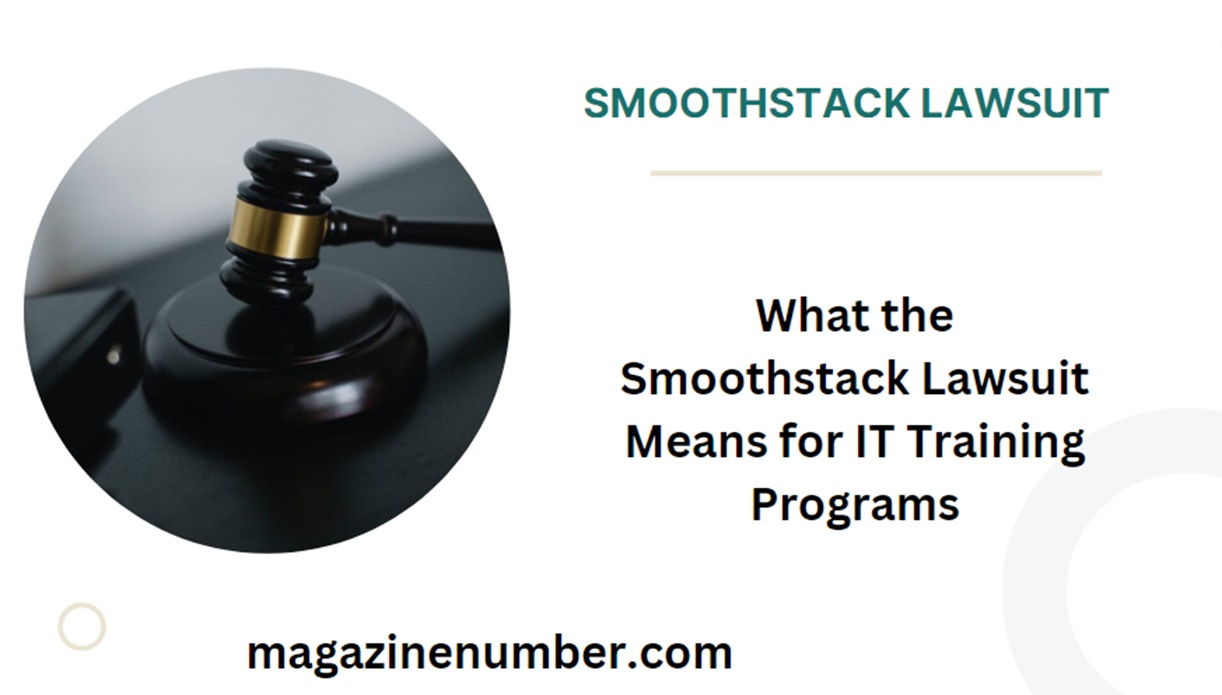Smoothstack Lawsuit
In recent months, the tech industry has been buzzing with news about the Smoothstack lawsuit. Smoothstack, a prominent IT staffing and training company, has found itself embroiled in legal challenges that have sparked widespread attention. If you’ve been following the story or are just now hearing about it, here’s a comprehensive breakdown of the key details and implications.
Table of Contents
Background on Smoothstack
Smoothstack is known for its innovative approach to training and deploying IT professionals. Founded with the mission to bridge the gap between education and employment, Smoothstack offers intensive training programs designed to equip individuals with the necessary skills to excel in the tech industry. Upon completion, participants are placed in various tech roles, providing a bridge between education and employment in a highly competitive field. This model has been lauded for its potential to address the talent shortage in tech, creating pathways for both new graduates and career changers to enter the industry.
The Allegations
The lawsuit against Smoothstack revolves around several allegations, primarily focusing on the company’s business practices and treatment of its trainees. Key points include:
Misrepresentation of Employment Opportunities
Plaintiffs allege that Smoothstack misrepresented the nature and quality of the employment opportunities available after completing their training programs. There are claims that the jobs offered did not meet the promised standards in terms of pay, job role, and career advancement. According to the plaintiffs, the reality of the positions provided often fell short of what was advertised, leading to disappointment and financial strain.
Contractual Disputes
Several former trainees have brought up issues related to the contracts they were required to sign. These contracts allegedly contained terms that were not clearly explained, leading to confusion and dissatisfaction among the participants. The plaintiffs argue that they were not given sufficient time or information to fully understand the contractual obligations, including non-compete clauses and repayment terms for the training costs if they left the company prematurely.
Unpaid Wages and Benefits
Another significant allegation is that some trainees did not receive the wages and benefits they were entitled to during and after their training period. This includes disputes over the amount of pay and the timeliness of payments. Some former trainees claim that they were promised certain benefits that were never delivered, contributing to their overall sense of being misled.
Coercive Practices
Additional allegations suggest that Smoothstack employed coercive practices to retain trainees who were unhappy with their placements. This includes pressuring trainees to stay in positions they found unsatisfactory by threatening legal action for breach of contract. Such practices have raised serious ethical concerns about the company’s treatment of its trainees and its overall business ethics.
Smoothstack’s Response
Smoothstack has responded to the allegations by firmly denying any wrongdoing. The company maintains that their programs are designed to provide valuable training and legitimate employment opportunities. They argue that the terms of their contracts are transparent and that any discrepancies are isolated incidents rather than a reflection of their overall business practices.
Public Statements
In a public statement, a representative from Smoothstack emphasized their commitment to their trainees and clients, stating, “We take these allegations seriously and are working diligently to address them. Our goal has always been to foster the growth and success of our trainees in the tech industry.” The company has also highlighted testimonials from successful trainees who have benefited from the program, using these positive experiences to counter the negative claims.
Internal Review
Smoothstack has initiated an internal review of their practices to ensure compliance with all legal and ethical standards. This includes revisiting their contractual terms and the transparency of their recruitment process. The company has expressed a willingness to make necessary adjustments to improve trainee satisfaction and prevent future disputes.
Legal Proceedings
The lawsuit is still in the early stages, and it is likely to be a prolonged legal battle. Both sides are gathering evidence and preparing for what could be a lengthy court process. As the case unfolds, it will be crucial to monitor how the evidence presented by both parties influences the proceedings.
Discovery Phase
Currently, the case is in the discovery phase, where both parties exchange information and evidence related to the allegations. This phase is critical as it will shape the arguments and strategies of both the plaintiffs and the defense. Legal experts predict that this phase could reveal more details about the inner workings of Smoothstack and the experiences of the trainees.
Potential Outcomes
The potential outcomes of this lawsuit vary widely. If the allegations are proven, Smoothstack could face significant financial penalties and be required to change their business practices. Conversely, if Smoothstack successfully defends itself, it may strengthen its position in the market and reassure potential trainees of its credibility. The lawsuit could also end in a settlement, where both parties agree to resolve the dispute outside of court.
Implications for the Industry
The outcome of the Smoothstack lawsuit could have significant implications for the IT staffing and training industry. If the allegations are proven, it may prompt increased scrutiny and regulatory oversight of similar companies. This could lead to stricter standards and more transparency in how these companies operate.
Regulatory Changes
Regulatory bodies might introduce new guidelines to ensure that IT staffing and training programs provide clear and accurate information to potential trainees. This could include requirements for greater transparency in advertising, clearer contract terms, and more robust mechanisms for addressing trainee grievances. Such changes would aim to protect individuals from misleading practices and ensure fair treatment within the industry.
Industry Reputation
The lawsuit has already sparked discussions about the ethical practices of companies within the IT staffing and training sector. Regardless of the lawsuit’s outcome, it may lead to a broader reassessment of how these companies operate and the standards they should uphold. This could result in a push for industry-wide reforms to maintain trust and credibility among potential trainees and clients.
Best Practices
As the industry watches the Smoothstack case, companies may proactively adopt best practices to avoid similar legal challenges. This includes improving transparency in their recruitment and contractual processes, ensuring fair treatment of trainees, and addressing any grievances promptly and effectively. By taking these steps, companies can enhance their reputation and attract more trainees who feel confident in the program’s integrity.
What’s Next?
For those closely watching the Smoothstack lawsuit, the next steps will involve following court dates, filings, and statements from both parties. It’s also important to keep an eye on industry reactions and any potential regulatory changes that might arise from this case.
Court Dates and Filings
Upcoming court dates will provide more insights into the progress of the case. Filings from both sides will likely reveal additional details about the allegations and defenses, offering a clearer picture of the strengths and weaknesses of each side’s arguments. Legal analysts and industry observers will closely scrutinize these developments to predict potential outcomes.
Industry Reactions
The industry’s reaction to the lawsuit will be telling. Companies may issue statements supporting Smoothstack or criticizing the allegations, reflecting their positions on similar practices. Industry associations might also weigh in, offering guidance or setting new standards to address the concerns raised by the lawsuit.
Trainee Perspectives
The perspectives of current and former trainees will be crucial in shaping the narrative around the lawsuit. Media outlets and industry publications will likely seek out trainee testimonials to understand their experiences and viewpoints. These personal stories will add depth to the broader discussion about the ethical and legal responsibilities of IT staffing and training companies.
Conclusion: Smoothstack Lawsuit
The Smoothstack lawsuit highlights critical issues within the IT staffing and training sector, raising questions about business practices, contractual transparency, and the treatment of trainees. As the legal process continues, it will be essential to stay informed about developments and understand the broader implications for the industry. Whether you are a potential trainee, a tech professional, or simply interested in the dynamics of the tech industry, the Smoothstack lawsuit is a significant story worth following.
Key Takeaways
- Misrepresentation Allegations: The core of the lawsuit involves claims that Smoothstack misled trainees about job opportunities, pay, and career advancement.
- Contractual Disputes: Issues have been raised about the clarity and fairness of the contracts trainees were required to sign.
- Unpaid Wages: Some trainees allege they did not receive the wages and benefits they were promised.
- Smoothstack’s Defense: The company denies any wrongdoing and is conducting an internal review to address the allegations.
- Industry Impact: The lawsuit could lead to increased regulatory oversight and changes in industry practices to ensure transparency and fair treatment of trainees.
- Future Developments: The case is in its early stages, and the discovery phase will be critical in determining the direction of the legal proceedings.
Staying Informed
For those interested in the ongoing developments of the Smoothstack lawsuit, it is advisable to follow reputable news sources and industry publications. These outlets will provide updates on court proceedings, expert analyses, and reactions from key stakeholders within the tech industry. By staying informed, individuals can better understand the implications of the lawsuit and its potential impact on the IT staffing and training sector.
Broader Implications
Beyond the immediate legal battle, the Smoothstack lawsuit serves as a cautionary tale for the tech industry. It underscores the importance of ethical business practices, transparency, and fair treatment of employees and trainees. As the industry continues to evolve, companies must prioritize these values to maintain trust and foster a positive environment for growth and innovation.
The Smoothstack lawsuit is more than just a legal dispute; it is a pivotal moment that could shape the future of IT staffing and training. By examining the details and implications of this case, we can gain valuable insights into the challenges and opportunities facing the industry today.
Read our blogs at – Magazine Number.



